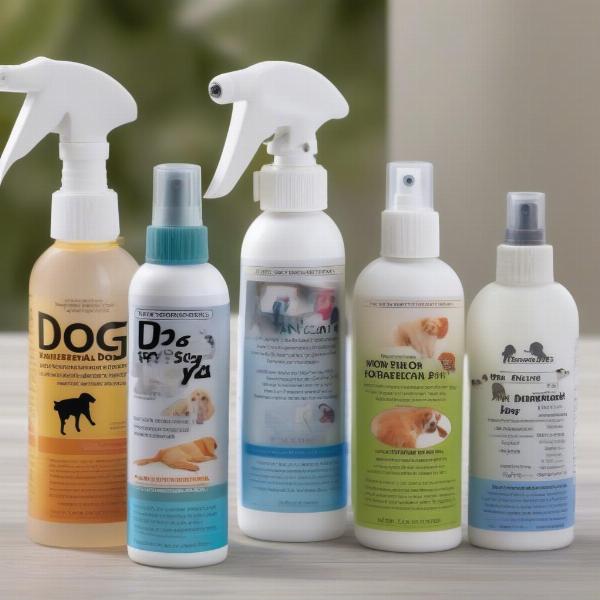Dog wound sprays are a convenient and often essential part of a dog owner’s first-aid kit. Whether it’s a minor scrape from an adventurous romp in the park or a small cut from a playful tussle with a housemate, having a reliable dog wound spray on hand can help prevent infection and promote healing. But with so many options available, how do you choose the right one for your furry friend? This guide will explore the various types of dog wound sprays, their uses, and important factors to consider when making your selection.
 Different types of dog wound sprays
Different types of dog wound sprays
Understanding Different Types of Dog Wound Sprays
There are several types of dog wound sprays available, each designed for specific purposes:
- Antiseptic Sprays: These sprays help to clean the wound and kill bacteria, preventing infection. They are suitable for minor cuts, scrapes, and abrasions.
- Antibacterial Sprays: Similar to antiseptic sprays, these target bacteria specifically. They are a good option for wounds that are already infected or at high risk of infection.
- Antifungal Sprays: These sprays are used for fungal infections, which can often manifest as itchy, red patches on the skin.
- Natural Sprays: These sprays often contain ingredients like aloe vera or tea tree oil, known for their soothing and healing properties. They can be a good option for sensitive skin or for pet owners who prefer a more natural approach. However, always check for potential allergies before using. antibiotic spray for dogs
- Styptic Sprays: These are specifically designed to stop bleeding from minor cuts and nail trims. They work by constricting blood vessels.
Factors to Consider When Choosing a Dog Wound Spray
Selecting the right dog wound spray involves considering several factors:
- The type of wound: Is it a cut, scrape, burn, or bite? Different wounds require different treatments.
- Your dog’s skin sensitivity: If your dog has sensitive skin, opt for a hypoallergenic or natural spray.
- Ingredients: Check the label for any ingredients your dog might be allergic to.
- Vet recommendations: It’s always best to consult with your veterinarian for recommendations tailored to your dog’s specific needs. dog hydro bath
How to Apply Dog Wound Spray
Proper application is crucial for effective treatment:
- Clean the wound: Gently clean the wound with warm water or a saline solution.
- Dry the area: Pat the area dry with a clean towel.
- Apply the spray: Hold the spray a few inches away from the wound and spray evenly.
- Monitor the wound: Check the wound regularly for signs of infection or healing. can you use savlon on dogs
When to Seek Veterinary Care
While dog wound sprays can be helpful for minor injuries, it’s important to know when to seek professional veterinary care:
- Deep wounds: Wounds that are deep or bleed profusely require immediate veterinary attention.
- Puncture wounds: These can be prone to infection and should be examined by a vet.
- Bites: Animal bites can transmit diseases and require professional cleaning and treatment.
- Signs of infection: If the wound becomes red, swollen, or starts to discharge pus, consult your veterinarian.
“Always err on the side of caution,” advises Dr. Emily Carter, a veterinary dermatologist with over 15 years of experience. “If you’re unsure about the severity of your dog’s wound or the appropriate treatment, it’s always best to seek professional advice.”
Conclusion
Choosing the right dog wound spray can be a simple yet important decision in caring for your furry companion. By understanding the different types of sprays available and considering your dog’s specific needs, you can help ensure proper healing and prevent potential complications. Always consult with your veterinarian for personalized advice and to address any concerns you may have. Remember, a well-stocked first-aid kit and a proactive approach to wound care can help keep your dog happy and healthy. neo poly bac ointment for dogs
FAQ
- Can I use human wound spray on my dog? No, it’s not recommended to use human wound sprays on dogs as they may contain ingredients that are toxic to pets.
- How often should I apply dog wound spray? Follow the instructions on the product label or as directed by your veterinarian.
- What should I do if my dog licks the wound spray? Most dog wound sprays are designed to be safe if ingested in small amounts, but it’s best to prevent your dog from licking the wound by using an Elizabethan collar. protection collars for dogs
- How long does it take for a dog wound to heal? Healing time varies depending on the severity of the wound. Minor scrapes may heal within a few days, while deeper wounds can take several weeks.
- Can I use dog wound spray on a burn? No, do not use wound spray on burns. Consult your veterinarian for appropriate burn treatment.
- What is the best dog wound spray for hot spots? Consult your veterinarian for recommendations as hot spots often require specific treatment.
- Are there any side effects of using dog wound spray? Some dogs may experience mild skin irritation or allergic reactions to certain ingredients.
ILM Dog is your one-stop resource for expert advice on all aspects of dog care and well-being. We offer a comprehensive range of articles and guides on dog breeds, health, training, nutrition, grooming, and much more. We are passionate about providing dog owners with the information they need to provide the best possible care for their beloved companions. Contact us for expert advice and support: Email: [email protected], Phone: +44 20-3965-8624. Visit ILM Dog today!